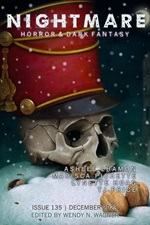“Bête Noire” by Lynette S. Hoag
“The Twelve Dying Princesses” by Marisca Pichette
“For All Your Other Daughters” by Ashlee Lhamon
Reviewed by David Wesley Hill
Machines that turn on their masters is a familiar science fictional story line, and it’s always a pleasure to find a new twist on the plot, as in the first of three strong tales in the December Nightmare, “Bête Noire” by Lynette S. Hoag. Here, the machine is a “fully AI-integrated house,” a “resplendent, cavernous Mediterranean style mansion spanning a full block” named Black Dahlia. Unfortunately, the edifice is overly fond of their creator—“Maker”—and becomes jealous when he brings home Brooklyn Drake, a “socialite and an heiress … queen of reality television.” What follows is predictable to anyone who ever watched 2001: A Space Odyssey, but vivid characterization and deft pacing defy cliché and make the story an entertaining read… Recommended.
Fairy tales are gruesome things, and they’re even more macabre when stripped down to a hundred words or less and deconstructed, as is the case in “The Twelve Dying Princesses” by Marisca Pichette, which, as the title suggests, provides a dozen such pithy scenarios. Heavily meta, the story is also heavily footnoted, a literary device that actually works rather well, adding to the surreal feeling of the piece… Recommended.
In our world, the vagina dentata is a myth, but in the world of “For All Your Other Daughters” by Ashlee Lhamon, the last story of the month, women are born with a set of teeth down there. As you might imagine, this creates a society somewhat different from our own, and redefines the relationship between men and women—and the nature of consent—in unexpected ways. The tale recounts the narrator’s experience of reaching puberty and losing her virginity to a boy in the backseat of a car, an ordinary enough event in our reality, but an eerily fraught procedure in the milieu of the story… A well-realized exploration of what if? Recommended.
 Nightmare
Nightmare